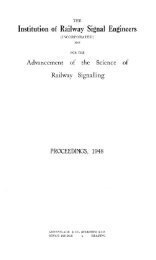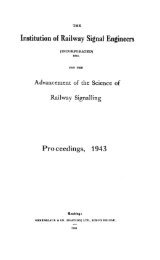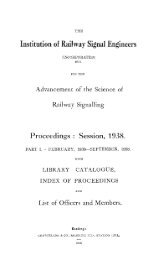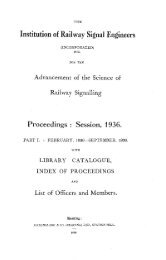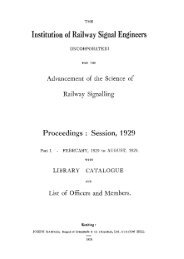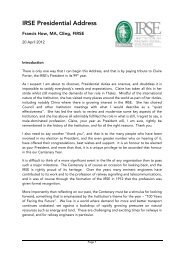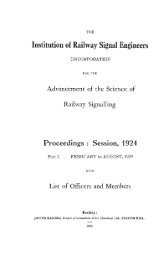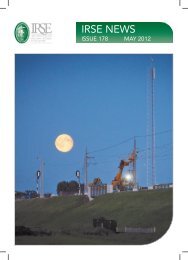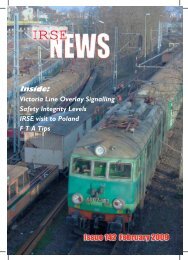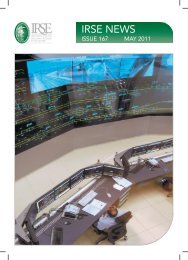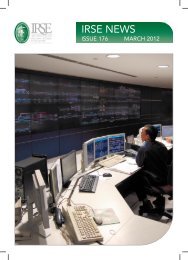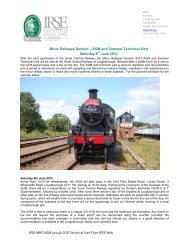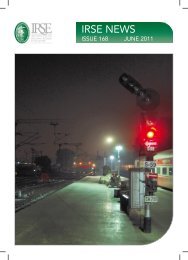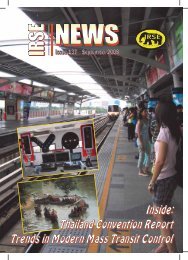IRSE News 140 Dec 08.pdf
IRSE News 140 Dec 08.pdf
IRSE News 140 Dec 08.pdf
Create successful ePaper yourself
Turn your PDF publications into a flip-book with our unique Google optimized e-Paper software.
NOVEMBER TECHNICAL PAPER<br />
<strong>IRSE</strong><br />
deployed in Great Britain. The focus has<br />
been on considering on-the-day operation,<br />
that is considering the stages between the<br />
finalising of each day’s operational plan<br />
and its post-execution review.<br />
It is perceived that significant<br />
efficiency, performance and capacity<br />
opportunities are available through a<br />
strategic review of operational processes<br />
in combination with technology<br />
advancement. In reality, the opportunities<br />
arise from a shift in our current approach<br />
to traffic management of the network<br />
combined with technological advancement<br />
of in-cab signalling systems and automatic<br />
train operation.<br />
Traffic Management<br />
Traffic management is defined as:<br />
“System & telecommunications based<br />
tools (excluding the safety-critical layer) to<br />
facilitate the on-the-day execution and<br />
optimisation of the plan with the resources<br />
available.”<br />
Through the development of a series of<br />
future scenarios with industry engagement,<br />
the following principles have been<br />
established for future traffic management<br />
systems:<br />
1. Planning is a continuous process;<br />
2. Information should be integrated<br />
and logically stored only once;<br />
3. Information about any aspect of the<br />
service (infrastructure, crew<br />
diagrams, stock diagrams etc.)<br />
should be available in real time;<br />
4. Everyone in the process plans<br />
against a common plan held<br />
centrally;<br />
5. Tools should be predictive and<br />
provide decision support;<br />
6. Information should be delivered in<br />
an enabling format;<br />
7. Customer information and service<br />
information are largely by-products,<br />
delivered as soon as the plan<br />
changes;<br />
8. There should be one-stop-shop<br />
accountability within roles to<br />
minimise verbal communications<br />
and hand-offs;<br />
9. Engineering information should be<br />
available in real time;<br />
10. Possessions should be integrated<br />
with the plan.<br />
In the context of the operating strategy,<br />
when a train is signalled and proceeds it<br />
should be seen as the culmination of years<br />
of planning. Our current approach to<br />
setting routes is based upon outdated<br />
systems, and on the majority of network is<br />
largely a human based decision upon the<br />
information that becomes visibly apparent<br />
in real time. Additionally, currently there<br />
are very few decision making tools<br />
provided in terms of operating the railway.<br />
The principles above, and the systems<br />
supporting them, need to evolve to the<br />
point whereby planning is a continuous<br />
process across the industry, and that<br />
changes and variations of timetables,<br />
network availability or resources are<br />
reflected in real time. Industry decision<br />
making support tools need to be deployed<br />
to improve the ability to deliver the aspired<br />
outputs from the operational railway, i.e.<br />
improved performance and capacity.<br />
Figure 1 illustrates the shift required from<br />
today to the future vision.<br />
Your first stop for<br />
signalling qualifications<br />
A selection of<br />
upcoming events:<br />
Buy One Get One<br />
Half Price on all<br />
S&T 2008 Dates*<br />
*Terms & conditions apply<br />
Date of<br />
Course:<br />
Course<br />
Title:<br />
02/12/08 High Voltage Impulse Track Circuits<br />
08/12/08 Introduction to Jointing External Telecomms Cable<br />
08/12/08 Solid State Interlocking<br />
08/12/08 Basic Signalling Technology<br />
09/12/08 Signal Works Testing Module 5<br />
11/12/08 Advanced Jointing of External Telecomms Cable<br />
15/12/08 Basic Jointing 5<br />
15/12/08 Intermediate Signalling Control Tables<br />
15/12/08 Intermediate Signalling Technology<br />
Catalis has a complete portfolio for Signalling & Telecommunications.<br />
For more information on our open programme or bespoke events, please<br />
call our team on: 0845 880 8108 or email: hotline@catalis.co.uk<br />
Training supplied at our fully equipped sites in Derby and Clapham<br />
Approved Centre<br />
www.catalis.co.uk<br />
Delivering performance through people<br />
<strong>IRSE</strong><br />
NEWS Issue <strong>140</strong> <strong>Dec</strong>ember 2008 3



